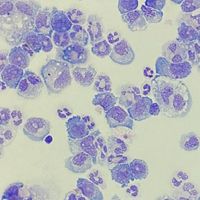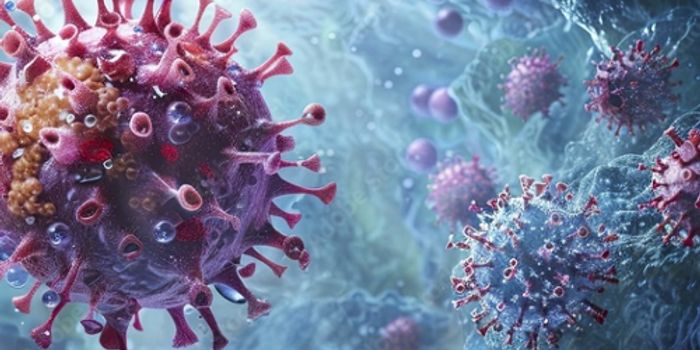New Therapeutic Target Found in Solid Tumors
Treatment for solid tumors has improved in the last two decades with the emergence of immunotherapy. Immunotherapy is a form of cancer treatment that leverages the immune system to recognize and target the tumor. In many cases, solid tumors go undetected because it employs mechanisms to avoid immune cell detection. Additionally, tumors will secrete proteins and other factors that suppress immune cell function as well as polarize cells to promote tumor growth. As a result of these immunosuppressive mechanisms, many solid tumors are highly aggressive and metastasize or travel to distant tissue sites in the body.
Many different immunotherapies target T cells, which are highly specific immune cells that recognize and eliminate infected cells. T cells will bind to proteins on the surface of cancer (or infected) cells and recognize that it is not part of the body. Consequently, T cells will then release proteins to lyse or eliminate the cell. However, many of the secreted proteins by the tumor dysregulate T cells, which inhibit their function. Solid tumors also lack many surface proteins that differentiate them from normal cells, which makes it harder for immune cells to recognize. Scientists are currently working to find novel targets to efficiently target tumors with limited toxicity.
A recent paper in Cancer Discovery, by Dr. Arul Chinnaiyan and others, identified an enzyme or protein that enhances immune response to solid tumors. Chinnaiyan is a clinician scientist, S.P. Hicks Endowed Professor of Pathology, and Director of the Michigan Center for Translational Pathology at the University of Michigan Medical School. He is also serves on the Board of Scientific Advisors for the National Cancer Institute. His work focuses on investigating different biomarkers in cancer to improve therapies and predict beneficial outcomes for patients.
It has previously been found that the protein labeled ubiquitin-like modifier activating enzyme 1 (UBA1) contributes to tumor growth and progression. Chinnaiyan and others discovered that inhibiting UBA1 increases T cell activity and sensitizes the solid tumor to immunotherapies. The observation that T cells increase with UBA1 inhibition is novel because previously it was only thought to have an effect on the tumor. In this case, UBA1 inhibition can also reshape the environment around the tumor (known as the tumor microenvironment; TME). This discovery is a breakthrough in cancer therapy research. It allows scientists to enhance treatment through combination therapy.
The team of researchers analyzed genetic data from hundreds of human metastatic prostate samples. They looked at prostate because of the tumor’s resistance to the immune system and to therapy. After analyzing gene expression, 17 genes were highly expressed and correlated with immune suppression. The strongest correlation included UBA1. Patient tumors with higher UBA1 expression were more resistant to immunotherapy. To understand this phenomenon more, researchers used mice to understand the mechanism behind UBA1.
Chinnaiyan and his team found that UBA1 overexpression blocked T cells from entering the TME, preventing immune cells from targeting the tumor. However, once UBA1 was blocked, T cells were able to infiltrate and target the tumor, reducing tumor growth. As a result, the team found significant tumor reduction once UBA1 inhibition was combined with an immunotherapy in the clinic. The inhibitor sensitizes resistant tumors to immunotherapy. Overall, this discovery made by Chinnaiyan and his team provide a unique approach to target solid tumors and enhance treatment efficacy.
Paper, Cancer Discovery, Arul Chinnaiyan, Michigan Medical School








